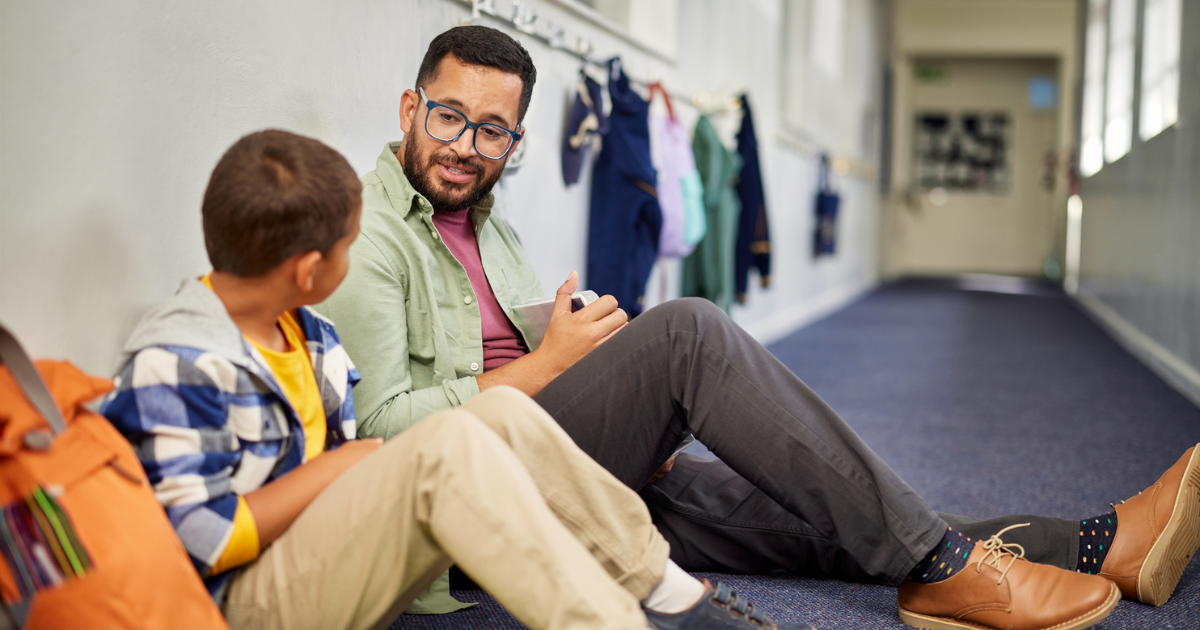How to support a child with anxiety

Anxiety is a common mental health issue that affects both adults and children. Unfortunately, when dealing with anxiety in children, it can be more difficult to understand when and how it's affecting them. So, it's even more important to know the signs and strategies for supporting children with anxiety.
Signs or symptoms of anxiety in children
- Avoiding normal activities like school, seeing friends or after-school activities.
- Complaints of headaches or stomachaches (often related to the brain-gut connection).
- Changes in typical behavior or demeanor.
- Mood changes or low energy lasting weeks to months.
- Expressions of hopelessness or unusual boredom.
- Experimenting with substance use.
Strategies to support children with anxiety
"The most common and straightforward action is to check in with your kid," says child and adolescent psychiatrist Daniel Gih, MD. Parents can ask about their child's day and what they enjoyed or disliked. Because everyone has a busy schedule, these opportunities to check in with your child are even more essential.
It’s also helpful to gather input from other adults who interact with your child, like teachers, daycare caregivers, music instructors or sports coaches.
"Having a natural curiosity about what your kids are doing and how they experience their day is important," says Dr. Gih. Asking about what they're doing and how they feel about it can help you better understand what your child is experiencing. "Hopefully, it's also an easy, not particularly stressful way of finding out how your kid is doing," says Dr. Gih.
When is therapy appropriate?
"You should consider therapy if there's a lot of change in your child's function, in their day-to-day expectations or responsibilities," says Dr. Gih. Although most parents may be reluctant to put their children in therapy, if there's a negative pattern lasting weeks to months, you should consider therapy.
Therapy can be especially helpful when kids don’t feel comfortable opening up to their parents ─ especially if their anxiety involves family issues. "Having a third party to talk to kids is helpful because they can better advocate for them and investigate what's going on with them," says Dr. Gih.
Still, it's important to remember that therapy isn't a quick fix. "Patients will often need at least a month, if not two to three months before they can make significant progress," says Dr. Gih. "I liken it to matchmaking or even trying a medication. You must try it for at least a few weeks, if not months, to know how it's going."
Signs your child might benefit from therapy include:
- Refusing to go to school.
- Unexplained drop in school performance.
- Physical complaints without a clear medical cause.
When to consider medication
Medication can also be a valuable tool for combating anxiety in children, though many parents have understandable concerns. "I think there's a lot of good reasons to feel this way," says Dr. Gih.
Currently, medications have had a lot of negative press, and those for kids are oftentimes not nearly as researched as their counterparts for adults. Additionally, there remains a stigma around mental health conditions and medications used to treat them.
There are also many myths about medicines changing your personality. For example, if you're creative, they'll make you uncreative or like a zombie. "This misconception isn't true," says Dr. Gih. "No psychiatrists want these negative outcomes for their patients. We want to make sure people are functioning at their best."
Medicines are another mechanism to combat anxiety. Ideally, a provider can combine medications and therapy to address the problem from two different angles, thereby improving the overall efficacy of treatment.
One of the most important aspects when using medicine to treat anxiety is your child's relationship with their healthcare provider. "Sometimes our approaches in therapy or the medications we select don't work right away, or we run into adverse side effects and therefore have to pivot," says Dr. Gih. "But if you have a good relationship with your provider, it's a much smoother process to finding the best treatment."
Treating anxiety in children
Some parents explore supplements or vitamins for anxiety, but Dr. Gih advises caution. However, there's little evidence to support these recommendations. "If a family is interested in such treatments, they should check with a doctor to make sure they're not using unnecessary amounts of these substances or exposing their kids to more harm," says Dr. Gih.
One of the best ways to help your child is to ensure they have a strong, supportive team around them, including coaches, teachers, therapists, counselors or other healthcare providers. Sometimes, parents or other family members aren't the first to realize something is amiss with their kids.
Above all, let your kid know they’re loved and safe. "I think sometimes we can be a little judgmental when people are experiencing mental health problems, and we may not know all the facts," says Dr. Gih. "So, having an open mind and being able to empathize with and listen to your kid is something every adult needs to practice, even if it means hearing unpleasant or hurtful things."





